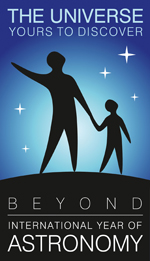"Europe builds on centuries of cooperation in astronomical research" by Janez Potocnik
12 January 2009
Not just stargazing: Europe builds on centuries of cooperation in astronomical research
by Janez Potocnik (European Commissioner for Science and Research) in Prague, Czech Republic on 7 January 2009.
"Thank you for inviting me to be the first speaker at today's event.
Happy 2009! I'm here to talk about astronomy, not astrology, but if I did have a crystal ball I would predict a successful six months ahead. It is easy to say that a year will be important or significant. But 2009 will undoubtedly be so for the Czechs, and for astronomy.
It is the year of the first ever Czech Presidency of the European Union. Presidencies are rewarding and demanding in equal measure - especially for a relatively new Member State. I can say this as a Slovenian. But I can also say that I am confident that you are up to the task.
It's a real pleasure for me to be here in Prague for another reason. It is a city that has been home to some of the great names of astronomy. People like Tycho Brahe, famous for his detailed astronomical observations in the 16th century; people like Johannes Kepler, who took those observations and formulated the mathematical laws defining the motion of planets.
This was ground breaking science then and it seems even more astonishing now when you think what resources we have at our fingertips, compared to what these innovators and brilliant thinkers had back then.
And if you want more evidence, all you have to do is look behind me at the Prague Orloj: a working astronomical clock, a six hundred year-old example of humanity's desire to look up and beyond the clouds and of humanity's ingenuity and intelligence.
I ask you then, what better place could there be to open the International Year of Astronomy 2009?
Europe has its place in this year. It has a long and proud tradition of excellence in astronomy. I've already spoken about Brahe and Kepler, I could also cite Galileo Galilei, the Italian who took a Dutch invention - the telescope - and used it to observe and understand the mysteries of the stars and the planets. Europeans have been at the forefront of astronomical research for many years. And they have been cooperating across borders for many years.
Back then, astronomical theory depended on access to the best technology of the time - and the innovations inspired by these theories pushed the development of technology. You won't be surprised to hear that this is still the case! Each new telescope or new instrument represents a new technological battle won and a stepping stone to new discoveries...and the need for even more sensitive and powerful instruments...and so on and so on...
These are exciting times for astronomical progress. There is a new generation of instruments so powerful that they really blow your mind! Some like the Atacama Large Millimetre Array in Chile are under construction; others, such as the European Extremely Large Telescope and the Square Kilometre Array or the Kilometre Cube Neutrino Telescope are in the advanced design stage.
They are dealing with and trying to answer some of the biggest questions of all, such as whether there is life on other planets, or how super massive black holes are formed.
But astronomy is not just about the big questions; it can also have a profound, but less acknowledged, influence on our everyday lives. Take adaptive optics for example, which are now being applied in medicine by visual researchers to allow for a clearer examination of the retina, and which can lead to earlier and more precise diagnoses of eye diseases.
...This is science made in the stars, but used by us.
Astronomy is the kind of science that gets peoples' attention. And it's that appeal which can have another important impact: as a showcase for a new generation of scientists and engineers. This is very important at a time when it is becoming more difficult to convince young people to pursue a career in science: it can attract students to physics, engineering and ICT. We need them.
Astronomy has yet another function: as a lever for strong economic and social recovery.
Advanced 21st Century instrumentation needs a high-tech industry to support it. It is at the core of what we call the knowledge triangle: the three corners of that triangle being research, industry and education. Now more than ever we need to remind ourselves just how important it is to invest in building a knowledge economy that can ride out our current economic and financial problems and sow the seeds for future prosperity through the creation of economic growth and new jobs. The free circulation of knowledge throughout a European Research Area - what we call the "fifth freedom" - is a crucial element of Europe's future competitiveness and growth.
What does this 5th freedom mean in reality? It means open access to research results, the right framework conditions, cross-border mobility for researchers, better cooperation between businesses, the public sector and universities, and public-private partnerships.
It will also need the kind of research infrastructures which have created these new astronomical wonders - research infrastructures that share the burden of innovation and research and optimise the funding available for increasingly complex and expensive research facilities. Because even looking at the heavens requires us to organise ourselves a little at ground level first!
Let me finish by wishing every success to the International Year of Astronomy in 2009. And I hope that I've convinced you - if you needed to be convinced - that this isn't just stargazing.
Thank you."
Origina source: http://ec.europa.eu/commission_barroso/potocnik/news/docs/20090107_speech_astronomy_en.pdf
Search IYA2009 Updates

National Nodes: 148
Organisational Nodes: 40
Organisational Associates:33
National Websites: 111
Cornerstone Projects: 12
Special Task Groups: 11
Special Projects:16
Official Products:8
Media Partners:22


